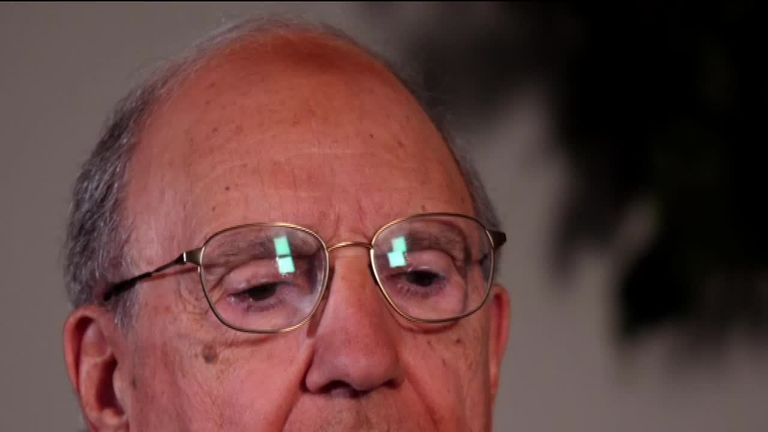Legal change could deny Irish citizens EU rights, campaigners fear
Some Irish citizens could lose EU rights because they are also British, in move rights groups say threatens Good Friday Agreement
Thursday 4 April 2019 22:01, UK
People born in Northern Ireland have expressed outrage at a legal change they say will deny them EU rights they claim as Irish citizens.
Researcher Emma DeSouza drew attention to new rules stating British citizens cannot also be EEA (European Economic Area) citizens - a clause that applies to Northern Irish who claim dual Irish and British nationality.
Despite Home Office insistence that dual citizens' rights will be unaffected by Brexit, Sinn Fein politicians have said the case "proves" the British government was "in breach of the Good Friday Agreement".
Under the 1998 deal - which secured peace in Northern Ireland after decades of violence - people born in Northern Ireland have the right to be British, Irish, or both.
Under current law, however, Irish citizenship is an entitlement, while British citizenship is automatically conferred on everyone in Northern Ireland - a system some object to.
"Being able to have Irish citizenship is a core thing about the Good Friday Agreement. One of the reasons nationalists got behind it is because they were told their Irish identity would be protected," Ms DeSouza said.
"When a government tells you your identity is not what you think it is and they remove rights from you on that basis, it is emotional."
Like some other Irish citizens in Northern Ireland, Ms DeSouza had hoped to claim settled status as an EU citizen in the UK after Brexit.
She hoped the move would secure her status as an Irish EU citizen, and rights available to EU but not British citizens - in particular the ability to be joined by non-EU family members in the UK.
The change, she believes, prevents that, creating a "two-tier system" in which Irish citizens in the Republic of Ireland are classed as EU citizens, while those in the North are not.
"Someone who was born in Donegal will have EU citizens' rights, while someone who was born in Derry won't," Ms DeSouza said.
Hundreds responded to Ms DeSouza's campaign with the hashtag #WeAreIrishToo, with one person describing the move as "emotionally devastating" and another "tantamount to ripping up the Good Friday Agreement".
Daniel Holder, of Irish human rights group CAJ told Sky News that by treating all Northern Irish citizens as British, the British government was blocking EU citizens from retaining EU rights after Brexit.
"Now if you are Irish and you are told your British that really annoys people in terms of their identity - as it would the other way round," he told Sky News.
"As Irish citizens remain EU citizens and everyone born in Northern Ireland either is or is entitled to be an EU citizen, you have up to 1.8 million EU citizens here who are being obstructed from retaining even EU citizens rights under the proposed Brexit agreement."
The benefits of EU citizenship include the right to bring non-EU partners to live in the EU - a process notoriously difficult under UK immigration rules.
Northern Irish citizens including Ms DeSouza have struggled to secure residence for non-EU partners because their British citizenship is seen to override their rights as EU citizens.
Campaigners fear that if they cannot be defined as EEA citizens after Brexit more problems like this will affect the 1.8 million citizens of Northern Ireland.
In a statement, the Home Office confirmed that people in Northern Ireland who are British or dual nationals cannot be granted status under the settlement scheme, but said "their rights and entitlements are not affected by the UK leaving the EU".
"How the people of Northern Ireland can be joined in the UK by their family members is being reviewed," a spokesperson said.
However immigration minister Caroline Nokes, responding to an urgent question by SNP politician Stuart McDonald, later said it would not carry out a "formal review" and said there was no timescale for the work.
Mr Holder said it was critical to handle the issue well, but expressed concerns.
"The government's institutional memory of the Good Friday Agreement and the importance of appears to have been lost," he said.
"Quite often they appear clueless as to the implications of actions like this are going to have."






